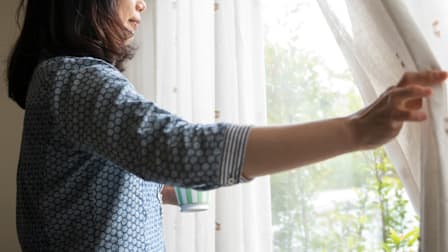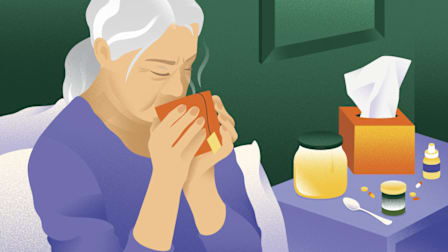Is It COVID-19 or Allergies?
Hay fever and respiratory infections share a lot of symptoms, such as congestion and sniffles

As you age, your sensitivity to allergens may wane. Still, about a third of people ages 54 to 89 have an allergy to an inhaled irritant like pollen. With symptoms like stuffy noses and sore throats, it can be tricky to tell whether allergies or a virus is to blame.
“We definitely see people who get a diagnosis of COVID a week or several days after symptoms begin that they’ve attributed to allergies,” says Laraine Washer, MD, a clinical professor of infectious diseases at the University of Michigan Medical School. Here, how to navigate this allergy season.
COVID-19 and Allergies
Some evidence suggests that the omicron variant of the coronavirus, which caused a massive surge of COVID-19, may come with slightly different symptoms from previous variants. Delta, for example, often caused symptoms like shortness of breath and pneumonia, while omicron may be somewhat more likely to cause a runny nose or congestion. According to a December 2021 analysis by the Centers for Disease Control and Prevention, the most common symptoms of omicron infections were cough, fatigue, and congestion or runny nose.
Smart Tips for the Season
Be on the lookout for new or unusual symptoms. If your symptoms are different from what you typically experience, “that would make me say, maybe this isn’t your allergies,” Rice says.
When in doubt, get tested. If you notice new symptoms that might be allergies but could also signal an infection, it’s wise to find out for sure. Washer suggests trying at-home antigen tests, which should be performed in a series. Take the first on day one of your symptoms, and the second a day or two later. If the symptoms haven’t worsened or evolved into something else, and those tests are negative, the person can be pretty sure they probably don’t have COVID-19, Washer says.
Seek treatment early. One reason to find out whether you have COVID-19 as soon as possible is that oral antiviral treatments (molnupiravir and Paxlovid) are now available for some eligible people, but these must be initiated within five days of the onset of symptoms in order to be effective. Check with your doctor about whether you qualify. Generally, older adults are at a higher risk for COVID-19 complications and severe illness, and so are good candidates for the antivirals, which can sharply reduce the risk of hospitalization and death.
Editor’s Note: A version of this article also appeared in the May 2022 issue of Consumer Reports On Health.




